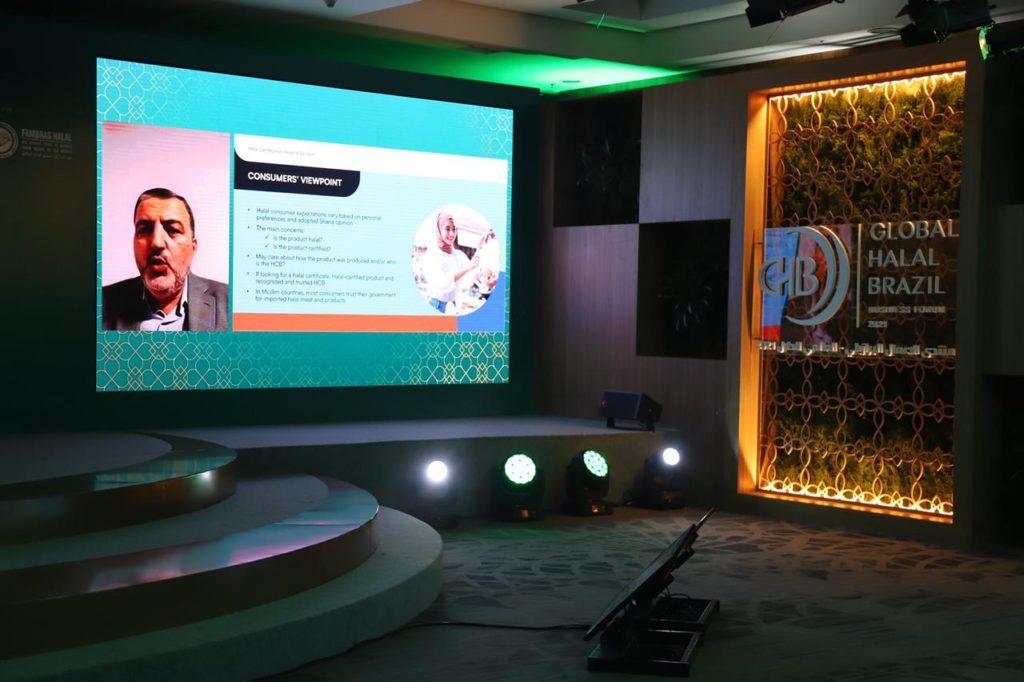The UAE comes in the global limelight, thanks to the Halal Congress Middle East that brought together the most influential and respected minds on Halal markets and standards to Sharjah. Halal Congress Middle East was organized by Halal Development Council (HDC Pakistan) with Expo Center Sharjah.
Leading industry experts and scholars from all over the world gathered for the inaugural Halal Congress Middle East that got under way at Expo Centre Sharjah on 11th and 12th Dec , 2012. The two-day event discussed and reviewed Halal practices and procedures as well as new opportunities that will arise with the growing global demand for Halal products. Delegates from 37 countries and 08 international institutions attended the congress.
The chief guest, UAE Minister of Education, H.E. Humaid Al Qutami, highlighted the importance of Halal certification and stressed the need to create awareness in this regard to promote Halal products.
The guest of honor from Pakistan, the Federal Minister for Commerce, Makhdoom Amin Faheem, highlighted that strength of Pakistan being a Muslim country is 100% Halal production base with over 180 million consumers and a direct access to a market of 470 million Halal consumers in Afghanistan, Central Asia and Middle East.

Makhdoom Amin Faheem said that Pakistan has emerged as an important player of food suppliers to the UAE and the Gulf region particularly in rice, meat, poultry, sea food, fruits and vegetables, and spices. He said that all products in Pakistan are Halal and we are in a position to claim a huge chunk of the global Halal market with a little bit of effort which require certification as Halal and subsequent labeling and packaging.
The Commerce Minister pointed out that Pakistan’s exports of food products to the UAE have increased to over US$500 million and more than US$1 billion to the GCC region. However, he underlined a dire need of value addition which can only be achieved by establishing Brands in the region and spending on the marketing efforts.
He also urged upon the international Halal experts to formulate strategies to develop the production and export of Halal products from the Muslim countries so that the Halal market should source the Halal food and other products from Pakistan, UAE and other Muslim countries. This will develop the Halal trade within the OIC countries and ultimately increase the standard of living of our population.
In his message, Professor Ekmeleddin Ihsanoglu, Secretary General of the Organisation of Islamic Cooperation, said that intra-OIC trade has increased progressively from 14 per cent in 2004 to 17.71 per cent in 2011 while in monetary terms it increased from $205 billion in 2004 to $687.74 billion in 2011. “With the recent entry into force of the OIC Trade Preferential System, its protocol and the Rules of Origin, the way is paved for the active participation of private sector in increasing trade exchanges within OIC.”
Saif Mohammed Al Midfa, director-general, Expo Centre Sharjah, highlighted the importance of the congress in bringing together and uniting the Muslim populations across the world. He also stressed the importance of achieving a universal model for Halal accreditation and practices. “Despite the various challenges that I am sure we will be facing, I am confident that we can achieve a universal Halal model in the near future,” said Al Midfa.
Mr. Asad Sajjad, CEO of Halal Development Council (HDC Pakistan) pointed out that the Halal trade is controlled by non-Muslim companies/countries, who are reaping the economic benefit by certifying their products as ‘Halal” and marketing it to the Muslim consumers with the ‘Halal Brand’.
The Muslim World has been slow to react to the opportunity that has presented itself in the last 2 decades with the increasing demand of Halal certified products in both food & non food sectors. Our products may genuinely be Halal, but due to our ignorance of the ‘Power of Halal Brand’ and Poor understanding of the importance of having the ‘Halal Certified’ logo, our products are not tested and certified as ‘Halal’ which is why the international Halal product buyers do not buy from the Muslim countries.
The Halal Development Council (HDC) understands and propagates the strong need to establish the identity of ‘One Halal’ brand to identify the product is made by Muslims, and to promote the OIC countries as the Halal product suppliers for the world.
Asad said that HDC intends to take the Halal Congress platform to other countries with the aim to promote the Halal trade within OIC and other countries with Muslim population, and to introduce the ‘Halal’ brand in the world as the guarantee for ‘Good Quality’ product.

The inaugural ceremony was also attended by His Eminence, Dr. Mustafa Ceric, Grand Mufti of Bosnia and Herzegovina and the President of the Senate of Bosniak Academy of Science and Arts; Haji Abdul Malik Kassim, Minister for Penang State Government, Malaysia, and Chairman, Penang International Halal Hub, Malaysia; Dr El Hassane Hzaine, director-general ICDT (Islamic Centre for Development of Trade of OIC); Dr. Mohammad Nahavandian, President Iran Chamber of Commerce, Industries and Mines; Mr. Haluk Dag Secretary General, Standards & Metrology Institute for Islamic Countries; Prof. Dr. Ibrahim S. Al-Mohizea, Vice President Food Affairs of Saudi Food & Drug Authority; Justice Khalil ur Rehman, Chairman – Punjab Halal Development Agency, Pakistan ; Mr. Hamed Lateef, Chairman, Halal Foods Technical Committee of Pakistan Standards & Quality Control Authority, Ministry of Science & Technology, Pakistan; and Saeed Obaid Al Jarwan, second vice-chairman, Sharjah Chamber of Commerce and Industry, Mohammed Saleh Badri, Acting Director General of Emirates Standards & Metrology Authority; Saif Mohammed Al Midfa, Director-General, Expo Centre Sharjah, representatives of diplomatic core, industry chambers, trade associations and government departments



